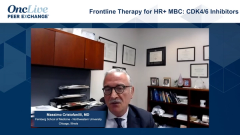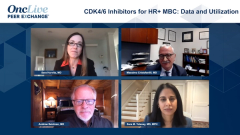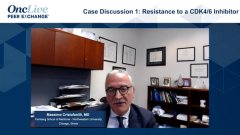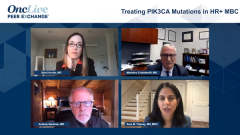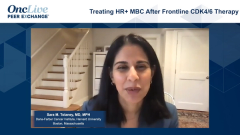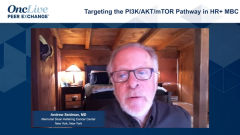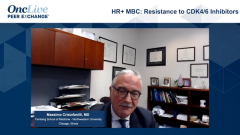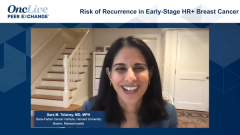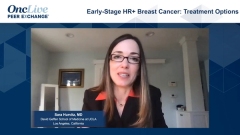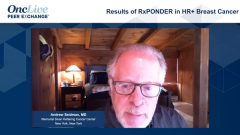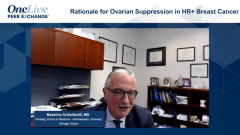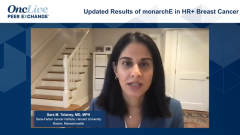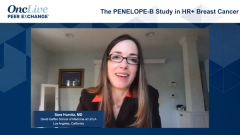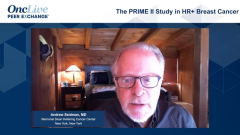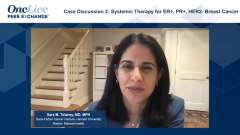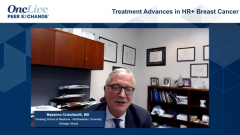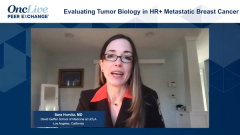
Case Discussion 1: Resistance to a CDK4/6 Inhibitor
Episodes in this series

Sara Hurvitz, MD: Let’s turn to a patient who’s progressing after a CDK4/6 inhibitor. Unfortunately, patents do progress even though we’re seeing amazing PFS [progression-free survival] data. This is a 56-year-old woman who was diagnosed with a stage IIB hormone receptor–positive HER2 [human epidermal growth factor receptor 2]–negative breast cancer. She had breast-conserving surgery, received adjuvant AC [doxorubicin, cyclophosphamide]–paclitaxel followed by radiation therapy, and an adjuvant aromatase inhibitor [AI] for 5 years. Three years after completing the adjuvant AI, she developed abdominal and hip pain. She had staging scans that showed metastatic recurrence in the liver and bone, which of course is confirmed by biopsy.
She received an AI plus a CDK4/6 inhibitor as frontline therapy and 29 months later developed progression in the liver and bone. She has an ECOG performance status of 0. No lab abnormalities were noted. She did have the ctDNA [circulating tumor DNA] sent for PI3 kinase analysis, and she has a PIK3CA E545K hot spot mutation identified.
Andrew, what’s your approach to molecular testing in this situation at the first progression? We’ve, of course sequenced her here. Are you just looking for PIK3CA mutations? Are you doing the whole next-generation sequencing on a liquid biopsy or tumor?
Andrew Seidman, MD: Certainly many people use the theracreen liquid biopsy assay for PIK3CA-mutation status. At MSK [Memorial Sloan Kettering Cancer Center], we have an in-house platform called MSK Access to do this. We can get other information, so I often do have that information. Not that I’m using it for off-clinical-trial action ability. But this is the moment absolutely for someone who has progressed on AI and CDK4/6 inhibition to be thinking about determining whether PI3 kinase is mutant or wild type. I often do start with liquid, and if it’s wild type and there’s easily accessible tissue, I may also get a biopsy at that time.
Sara Hurvitz, MD: Great. Massimo, can you tell us about PIK3CA mutations, how common they are, and hormone receptor–positive breast cancers? What should our process be if the liquid biopsy does not indicate a PIK3CA mutation? Should we be reflexing to tumor tissue?
Massimo Cristofanilli, MD: The case that you indicated certainly has been exposed for quite some time. There’s a liver that can definitely be biopsied, and I would certainly go for that: Confirm the yes status, and probably send for NGS [next-generation sequencing].
I will probably use an NGS liquid biopsy to have other information. Not necessarily only a PIK3CA mutation. This is a driver mutation. It’s present in 30%, 35% of patients with metastatic breast cancer. It’s 1 of the most common occurrences. Because a driver mutation means it’s been there, and it’s probably not always driving the resistance to endocrine therapy.
The activation of the pathway—all the way down to mTOR—has been associated with endocrine resistance. The importance of that is PIK3 inhibitors, which proved to be manageable in terms of toxicity. We probably will talk more about this regarding toxicity.
In the SOLO-1 trial there was advantage over the androgen therapy, where we have a mutation and tissue also in the liquid biopsy.
I would think it is an important mutation for actionable treatments in patients with resistance. That is very common in metastatic breast cancer. Not always. We need to act on mutations present.
Transcript Edited for Clarity


